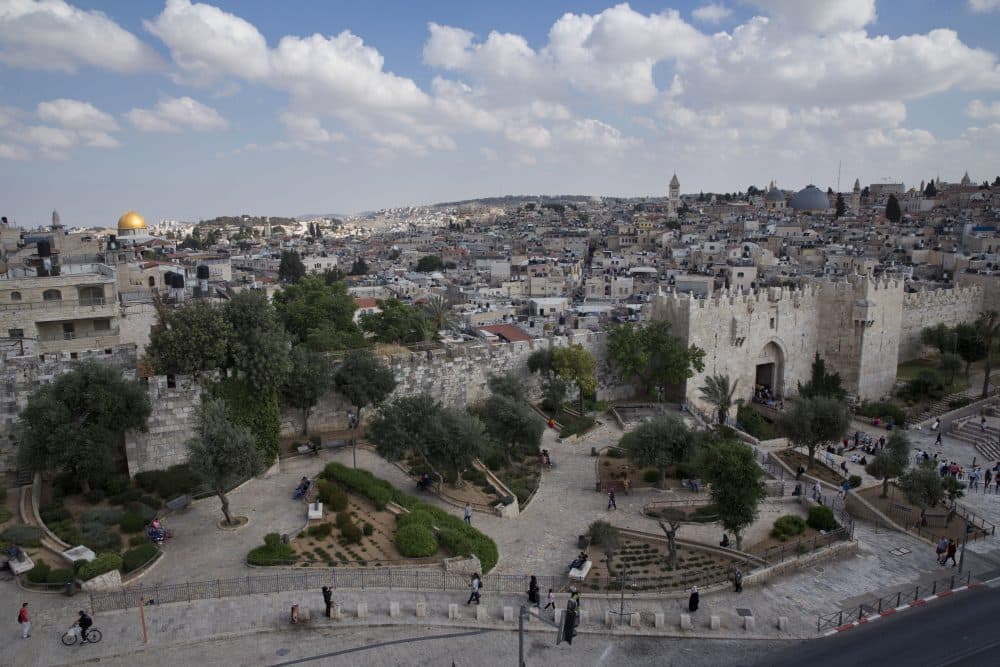Advertisement
Commentary
The Only Path To A Two-State Solution Lies Through A Divided Jerusalem

In December, the United Nations General Assembly voted overwhelmingly to reject the Trump administration’s decision to recognize Jerusalem as Israel’s capital. Traditional U.S. allies, including the United Kingdom and France, joined with 128 other countries to condemn U.S. policy.
But President Trump is right to recognize Jerusalem as the capital of Israel. Now, to preserve any hope of an Israeli-Palestinian peace process, he should also recognize Jerusalem as the capital of a future Palestinian state.
Israelis rightly claim Jerusalem as their capital. It is the symbolic core of the Israeli nation, the “center of Jewish consciousness.” It is where, Jewish tradition holds, that God gathered the dust to create Adam and Eve, where Abraham proved willing to sacrifice his son to demonstrate his faith and where King Solomon established the first Temple of the Jews, which would serve as the center of Jewish religious, cultural and political life for 3,000 years.
Simply put, without Jerusalem there is no viable Palestinian state.
But it is also the case that a Palestine without Jerusalem as its capital is inconceivable, that any settlement that excludes sovereignty over the city would be, as one advisor to former Palestinian leader Yasser Arafat put it, “an unacceptable compromise…[that] will make their blood boil.”
For Palestinian Muslims, what Jews refer to as the Temple Mount is the al-haram-al-sharif, the Noble Sanctuary, the third holiest site in the Islamic world. Palestinians will remove from power any leader willing to abandon Jerusalem as their capital of a future state. Simply put, without Jerusalem there is no viable Palestinian state.
While the idea that Jerusalem is the symbolic capital of Israel may be ancient and sacred, the argument that this mandates total and exclusive sovereignty claims to the city is recent and political. It was only pressure from Israel’s right that pushed the government towards declaring sole control over the city in the 1980s. Emboldened by the United States’ declaration, Prime Minister Benjamin Netanyahu’s Likud Party recently pushed a vote through Israel’s parliament that makes it more difficult to cede any part of Jerusalem during any future peace process.
Today, Israelis maintain that “Jerusalem, complete and united,” is the capital of Israel, and even the most ardent supporters of the peace process reject a divided Jerusalem: public opinion polls show that 80 percent of Israelis object to a Palestinian capital in Jerusalem. This is just one example of relatively new thinking. Early Zionist leaders were willing to compromise sovereignty over Jerusalem and even considered allowing an “internationalized” city, placing the territory under control of an international organization, or allowing the city to belong to multiple states.
Until 1967, the city was partitioned: Israel claimed sovereignty in West Jerusalem and Jordan controlled the eastern side of the city. Even in the wake of the Six Day War, after Israel annexed Jerusalem, then Prime Minister Levi Eshkol understood that Israel must accommodate Palestinian claims to the holy sites and share power with Palestinians as they governed the city.
Even the strongest proponents of a two-state solution suggest dividing Jerusalem is impractical. While it may have been possible to divide Jerusalem decades ago — when Israelis lived in the “West” and the Palestinians in “East” Jerusalem — today there are 200,000 Jewish settlers in East Jerusalem, and whatever the legality of their status, they will not be leaving anytime soon.
It was only pressure from Israel’s right that pushed the government towards declaring sole control over the city in the 1980s
But there are ways for Israelis and Palestinians to divide sovereignty over the city without ripping Jerusalem apart physically. In the 1990s, Israeli and Palestinian leaders proposed ways to divide and share sovereignty within Jerusalem’s boundaries. One option suggested the core of Jerusalem remain unified under an umbrella municipality, with autonomy given to Palestinian and Israeli boroughs within the city. Another option proposed a division between “political” and “religious” sovereignty. That solution would have allowed the Palestinians control over buildings of the Haram, and the Israelis authority over the Western Wall. In both of these scenarios, once the status of Jerusalem was secure, Israelis and Palestinians would have jointly recognized the city as the capital of their respective states.
Certainly much has changed since the negotiations of the 1990s, and the United States cannot unilaterally impose a divided Jerusalem. Ultimately Israeli and Palestinian leaders must negotiate the terms on which they can divide sovereignty over the city.
The United States could set a powerful baseline in recognizing Jerusalem as capital of both Israel and a future Palestinian state. Doing so would reaffirm the United States’ commitment to a two-state solution as the only way out of the Israeli-Palestinian conflict. It would signal that the United States will continue to act as an impartial broker in the conflict, and not an advocate for any one side. And it would allow the United States to repair its image in the eyes of Muslims throughout the world.
Given the president’s recent claim that he has “taken Jerusalem…off the table,” this path is unlikely. But any serious attempt to revive the Israel-Palestinian peace process requires recognizing that the only path to a two-state solution lies through a divided Jerusalem.
